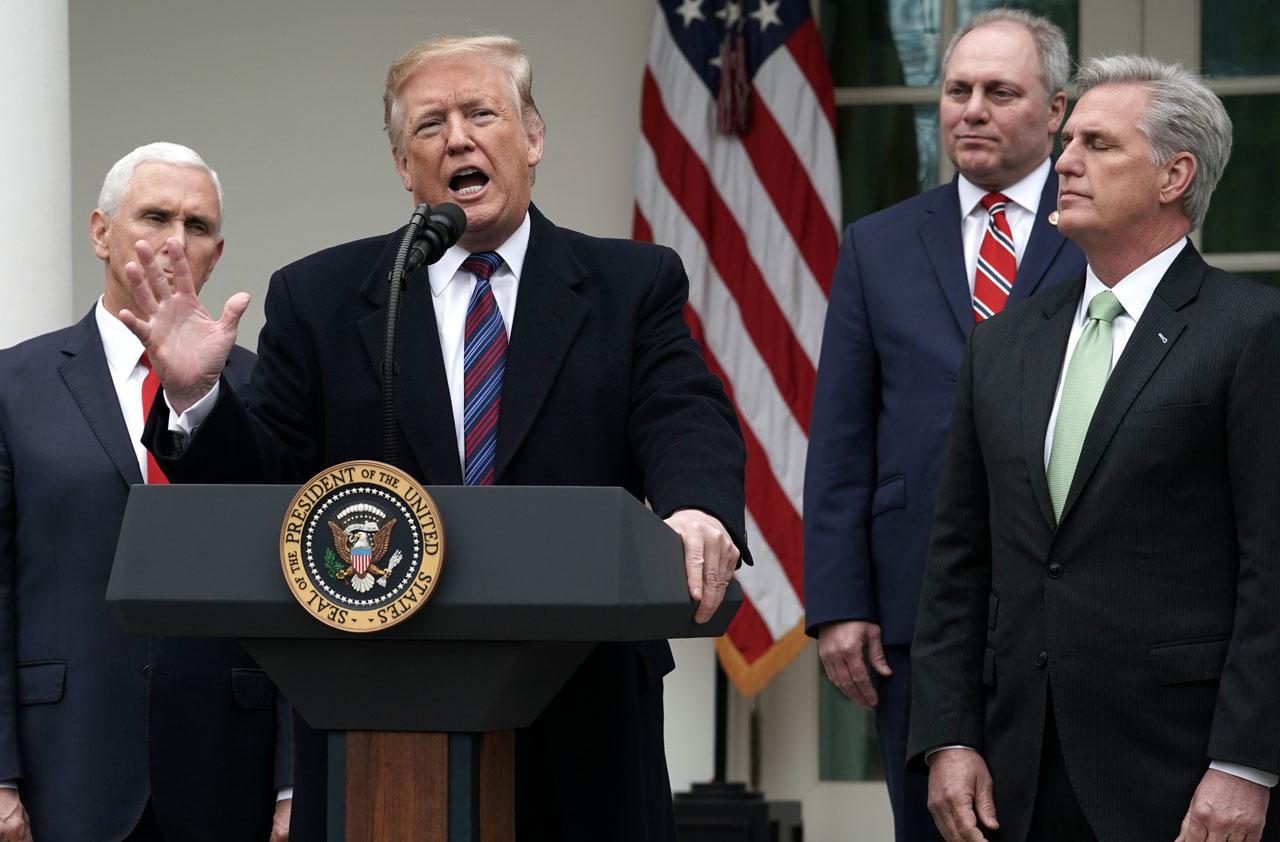What Trump Will Do Next
President-elect Trump begins his second term with a busy regulatory agenda.

Profit and prosper with the best of Kiplinger's advice on investing, taxes, retirement, personal finance and much more. Delivered daily. Enter your email in the box and click Sign Me Up.
You are now subscribed
Your newsletter sign-up was successful
Want to add more newsletters?

Delivered daily
Kiplinger Today
Profit and prosper with the best of Kiplinger's advice on investing, taxes, retirement, personal finance and much more delivered daily. Smart money moves start here.

Sent five days a week
Kiplinger A Step Ahead
Get practical help to make better financial decisions in your everyday life, from spending to savings on top deals.

Delivered daily
Kiplinger Closing Bell
Get today's biggest financial and investing headlines delivered to your inbox every day the U.S. stock market is open.

Sent twice a week
Kiplinger Adviser Intel
Financial pros across the country share best practices and fresh tactics to preserve and grow your wealth.

Delivered weekly
Kiplinger Tax Tips
Trim your federal and state tax bills with practical tax-planning and tax-cutting strategies.

Sent twice a week
Kiplinger Retirement Tips
Your twice-a-week guide to planning and enjoying a financially secure and richly rewarding retirement

Sent bimonthly.
Kiplinger Adviser Angle
Insights for advisers, wealth managers and other financial professionals.

Sent twice a week
Kiplinger Investing Weekly
Your twice-a-week roundup of promising stocks, funds, companies and industries you should consider, ones you should avoid, and why.

Sent weekly for six weeks
Kiplinger Invest for Retirement
Your step-by-step six-part series on how to invest for retirement, from devising a successful strategy to exactly which investments to choose.
To help you understand what's going on in U.S. politics, and what we expect to happen in the future, our highly experienced Kiplinger Letter team will keep you abreast of the latest developments and forecasts (Get a free issue of The Kiplinger Letter or subscribe). You'll get all the latest news first by subscribing, but we will publish many (but not all) of the forecasts a few days afterward online. Here’s the latest…
After a four-year Democratic intermission, Donald Trump will soon begin his second act as president, with the GOP in full control of Congress. Here’s what you should expect this time.
The likely defining issues of term two Trump:
From just $107.88 $24.99 for Kiplinger Personal Finance
Become a smarter, better informed investor. Subscribe from just $107.88 $24.99, plus get up to 4 Special Issues

Sign up for Kiplinger’s Free Newsletters
Profit and prosper with the best of expert advice on investing, taxes, retirement, personal finance and more - straight to your e-mail.
Profit and prosper with the best of expert advice - straight to your e-mail.
1. Trade. Trump has pledged to expand tariffs via executive action, including across-the-board duties of 10%-20% and a tariff of at least 60% on imports from China. Any such effort is sure to be challenged in court, as well as cause friction between Trump and congressional Republicans, who are hoping that Trump will collaborate with them. Legal experts say Trump can accomplish quite a bit on his own.
2. Immigration. A mass deportation effort targeting millions of undocumented people in the U.S. will similarly test the legal limits of Trump’s authority and increase tensions with Congress. Some GOPers fear the possible economic and political ramifications if the president-elect is able to execute his plan.
3. US Policy. Even if Trump falls short of his ambitions he can still substantially shift U.S. policy in less prominent ways. Don’t be surprised if Trump further stiffens U.S. export controls and makes foreign worker visas harder to obtain.
On the regulatory front, the usual partisan ping-ponging will take place. Trump will reverse numerous Biden administration environmental rules, including carbon emissions reductions for power plants and a pause on permits for liquefied natural gas terminals. Others could survive in a truncated form, since they have industry support, such as a rule to reduce methane emissions. The big question is whether Trump will modify his stance on electric vehicles, given his increasingly close relationship with Tesla CEO Elon Musk. The implications could be substantial for federal tailpipe emissions regs and other EV-related policies.
Also on tap: A more employer-friendly labor policy, with less of an emphasis on workplace safety. Expect Trump officials to target any low-hanging regulatory fruit, including a new workplace heat standard that is scheduled to take effect next year. The Biden administration’s forthcoming overtime rule also has a big target on its back, though it will be more difficult to undo if it takes effect on January 1, as scheduled. Health care will involve a revival of many first-term Trump policy proposals, such as Medicaid work requirements plus block grants and various policies intended to favor Medicare Advantage, a private-sector alternative to the federal health plan for seniors. Repealing the Affordable Care Act seems unlikely at this point, but Trump can still defang the law via federal rule changes, such as allowing health insurers to divide enrollees into different risk pools, with premiums adjusted accordingly.
4. Taxes
Taxes will be the top legislative priority for President-elect Trump and the GOP Congress: Specifically, extending the many provisions of Trump’s 2017 tax bill that expire at the end of 2025: the higher standard deduction, lower income tax rates, the $10,000 cap on state and local tax deductions, higher exemptions for estate tax and the alternative minimum tax, the 20% deduction for pass-through income, etc. (Note that the lower corporate income tax rate enacted in 2017 is not set to expire.)
Some additional tax reductions or reforms could also get a closer look. Trump campaigned on an array of tax breaks, like exempting certain income from tax. The challenge will be how, or whether, to pay for what Republicans want. Extending the 2017 cuts for another decade would take the annual deficit as a share of GDP from an already-high 6.1% to 7.4%. Whether bond investors will balk at that and demand higher yields on Treasury debt to finance such deficits is a key question.
This forecast first appeared in The Kiplinger Letter, which has been running since 1923 and is a collection of concise weekly forecasts on business and economic trends, as well as what to expect from Washington, to help you understand what’s coming up to make the most of your investments and your money. Subscribe to The Kiplinger Letter.
Related stories
- Tax Changes Are on Trump's 2025 To-Do List
- What Does the Trump Presidency Mean for the Fed?
- 5 Stocks to Buy for a Trump Presidency
Profit and prosper with the best of Kiplinger's advice on investing, taxes, retirement, personal finance and much more. Delivered daily. Enter your email in the box and click Sign Me Up.

-
 Nasdaq Leads a Rocky Risk-On Rally: Stock Market Today
Nasdaq Leads a Rocky Risk-On Rally: Stock Market TodayAnother worrying bout of late-session weakness couldn't take down the main equity indexes on Wednesday.
-
 Quiz: Do You Know How to Avoid the "Medigap Trap?"
Quiz: Do You Know How to Avoid the "Medigap Trap?"Quiz Test your basic knowledge of the "Medigap Trap" in our quick quiz.
-
 5 Top Tax-Efficient Mutual Funds for Smarter Investing
5 Top Tax-Efficient Mutual Funds for Smarter InvestingMutual funds are many things, but "tax-friendly" usually isn't one of them. These are the exceptions.
-
 Trump $10B IRS Lawsuit Hits an Already Chaotic 2026 Tax Season
Trump $10B IRS Lawsuit Hits an Already Chaotic 2026 Tax SeasonTax Law A new Trump lawsuit and warnings from a tax-industry watchdog point to an IRS under strain, just as millions of taxpayers begin filing their 2025 returns.
-
 The New Fed Chair Was Announced: What You Need to Know
The New Fed Chair Was Announced: What You Need to KnowPresident Donald Trump announced Kevin Warsh as his selection for the next chair of the Federal Reserve, who will replace Jerome Powell.
-
 Trump Reshapes Foreign Policy
Trump Reshapes Foreign PolicyThe Kiplinger Letter The President starts the new year by putting allies and adversaries on notice.
-
 Congress Set for Busy Winter
Congress Set for Busy WinterThe Kiplinger Letter The Letter editors review the bills Congress will decide on this year. The government funding bill is paramount, but other issues vie for lawmakers’ attention.
-
 The December CPI Report Is Out. Here's What It Means for the Fed's Next Move
The December CPI Report Is Out. Here's What It Means for the Fed's Next MoveThe December CPI report came in lighter than expected, but housing costs remain an overhang.
-
 The Kiplinger Letter's 10 Forecasts for 2026
The Kiplinger Letter's 10 Forecasts for 2026The Kiplinger Letter Here are some of the biggest events and trends in economics, politics and tech that will shape the new year.
-
 Special Report: The Future of American Politics
Special Report: The Future of American PoliticsThe Kiplinger Letter Kiplinger assesses the political trends and challenges that will define the next decade.
-
 The November CPI Report Is Out. Here's What It Means for Rising Prices
The November CPI Report Is Out. Here's What It Means for Rising PricesThe November CPI report came in lighter than expected, but the delayed data give an incomplete picture of inflation, say economists.